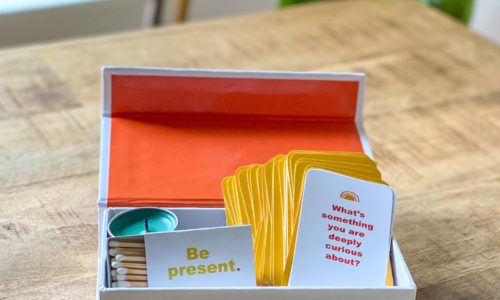Even better…. how does a concoction of world-class lectures with some spicy Socratic discussions on the side sound?
With all of our talk about being Socratic, it may surprise you that one of our favorite summer family experiences is listening to excellent lectures together delivered by experts from around the globe. The world is literally at our fingertips. It seems wasteful not to savor what is available when our schedule slows down and the days get longer. Some of our favorites are from The Great Courses. Right now we are enjoying the “Turning Points in History” series.
There are so many resources to explore. Here are just a few:
http://www.openculture.com/free_k-12_educational_resources#Tutorials
http://www.apple.com/apps/itunes-u/
At the opposite end of the educational spectrum is the Socratic discussion – near and dear to our hearts at Acton Academy as one of the great experiences for learning.
Several parents have asked for a “cheat sheet” to lead Socratic discussions at home. My five bullet points have turned into a bit of a lengthy notebook for you. I hope the information below helps you to embark merrily on your way:
What is the purpose of a Socratic discussion?
It might be easier to grasp what it is NOT. The purpose is not to come up with a right answer or to learn facts. These are not debates with a winner and loser; and they are not meant to deliver factual information. (I do love a good debate and I really like to win but I tuck that part of me away – or try very hard to – when the time comes to be Socratic.)
The true purpose of a Socratic discussion is to come to new or deeper understandings of oneself, others and the world through an authentic wrestling with thoughts, information and ideas. And the real adventure is that you have no idea where you will end up.
What does it take to have a good Socratic discussion?
- It takes letting go of preconceived agendas.
- It takes learning to listen more than you speak.
- It takes saying good-bye to your ego.
- It takes all participants following understood rules of engagement.
Our middle school Eagles wrote this list of rules for parents to follow:
- Listen carefully so you can respond to what was just said.
- Have a firm opinion but keep an open mind.
- Make a choice, no waffling or “weasel words.”
- Don’t raise your hand while other people are talking.
- Don’t fidget.
- Do make eye contact. (We sit so we can see all faces.)
- Refer back to what others have said; build on other people’s points but don’t repeat.
- Be concise.
When is the best time to have a Socratic discussion?
- When you are courageous enough to change your mind;
- When you want to understand others better;
- When you have time to listen;
- When you feel curious;
- When you want to learn something new;
- When you feel loving and open;
- When you want to experience living fully in the moment.
A good Socratic discussion should have a focused time limit: 15 – 30 minutes. The tension of a time constraint helps harness energy.
What must I do?
1. Prepare a “launch” that sets up a dramatic choice to be made.
You may set up the choice or dilemma by reading an article, story, quote; or watching a short video. A launch that works well is telling a personal story from your childhood about a dilemma you faced. Our children love to learn stories from our pasts. Be vulnerable. Be open to your emotions. Don’t reveal what you chose to do until after the discussion.
2. Once the dilemma or problem is set up, pose the choices available:
Should you do X or Y?
The idea here is to create the opportunity for concrete responses. Avoid asking open-ended questions like, “What do you think about….” or “Why do you think….” Open-ended questions push people deeper into their own thoughts rather than keeping them keenly listening and in the moment. This takes practice but the results are immediate and rewarding.
Another trick to force concrete responses is to ask for participants to rate something on a scale of 1-5; or rank a short list of things in order of importance. Taking a vote is a great tactic, too.
3. Manage the discussion process by listening and focusing on energy flow. Allow silences to happen. Wait patiently. Force participants to make a choice. No waffling. Dig deeper: Why?…why?…why? Other “digging” questions: “What evidence or experience do you have for that?” “Can you give me an example?” “Can you say that another way to clarify what you mean?”
4. When it’s clear energy is waning, it’s time heat things up by tossing in another question that narrows the choices or raises the stakes. It’s best to have 3-4 questions prepared before you start to keep the discussion moving. The best example to show you how to raise the stakes during a discussion is from our own classroom. Please read the note attached below.
5. Give a 5 minute wrap-up warning and then create a concluding experience – take a final vote; or ask who changed their minds and why; or simply ask each person to share a final thought or something new learned. Finish with sharing gratitude to all participants.
And there you have it. You are prepared to brew up your own Socratic discussion. Now, just toast up a few s’mores and you are set.
ADDITIONAL NOTE: In addition to leading a Socratic discussion, you can practice simply being Socratic in your general communication with your children. Instead of always answering their questions (which builds dependency on you,) try answering with another question. “What do you think is the best thing to do?” “Where do you think you can find the answer to that question?” “I trust you to figure that out.” “Oh, I can’t wait to see what you decide to do.” “You have all you need to answer that question yourself. What ideas do you have?” You will soon see your children being empowered to solve their own problems and take care of their own needs. Warning: This is hard for people like me who like to be needed, be in control and take care of people…okay, even spoil them. It’s hardest because at first they may want you to do things for them and fix their issues. They may beg and cry. Over time, I have now learned that being Socratic with my family is practicing love in a way that honors them more deeply. It takes more mental energy, time and patience but it ultimately sets them free to be who they are meant to be. This is true love. And it doesn’t mean I don’t get my fix “spoiling” them with affection, quality time together and mindful listening every day.
ADDITIONAL READING (oh please do read these!)
- Acton Academy’s Own Best Example of Asking Great Questions:
Socratic Questioning to Turn up the Heat.docx
- Jeff’s note for students and guides to use when helping each other in math. (Yes, math can be taught Socratically):
Thoughts on Teaching Math Socratically 6.13.docx
Happy summer!


